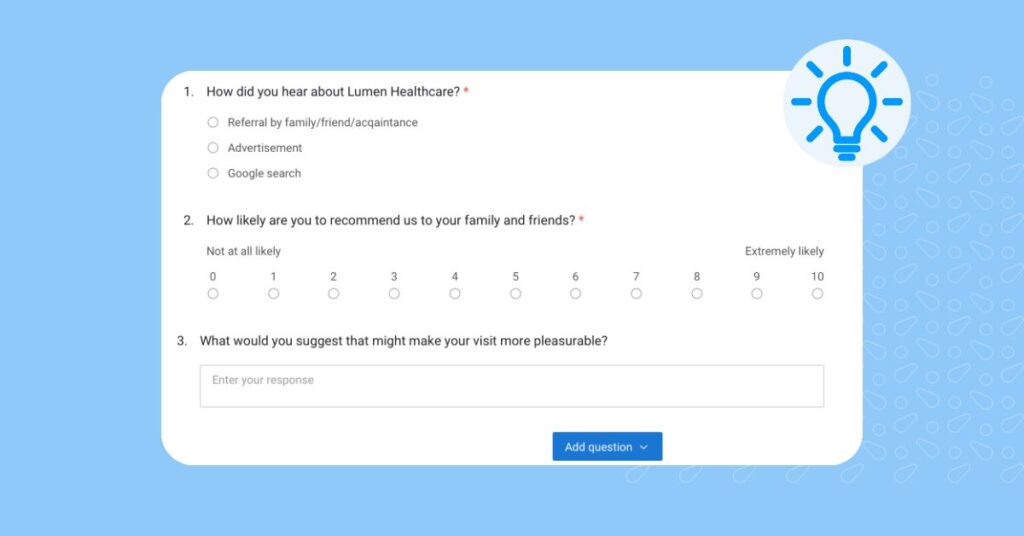Asking your customers a series of testimonial questions is a great way to learn more about their needs, wants, and expectations. More importantly, it will reveal whether your brand, products, and services impact your customers positively. When a customer writes a review, they talk about what is top of mind at that time — their experience with your business, their satisfaction with your products, etc. But in order to get feedback that is actionable, you may need to prompt them to talk about the different aspects of their experience. This is where testimonial questions can come in handy.
Table of contents
What are testimonial questions?
Testimonial questions are a powerful tool that allows you to gauge the value of your brand. Ideally, you want to ask the types of questions that will lead to honest customer testimonials, questions that reveal the quality of your customer service and the impact of your product offerings. Plus, if you receive a great testimonial from a customer, you can use it to convince leads and future customers of the efficacy of your offerings.
Why are the right testimonial questions important?
The growth of your business depends on how well you know your customers, and asking them the right testimonial questions will reveal the following:
- Brand perception: You want to know if your customers perceive your brand positively so you can determine whether your business is on the right track.
- Credibility: Well-rounded customer testimonials give future clients an idea of what they can expect if they choose to do business with you and lets them know that they can trust you.
- Opportunities for improvement: Customer testimonials act as valuable feedback and reveal specific opportunities for improvement relating to your products and customer service.
- Powerful testimonials: Ultimately, you want to receive at least one great testimonial or customer story that pinpoints the overwhelming impact of your product or service.
- Transparency: Asking testimonial questions shows that your business is willing to accept criticism, implement changes, and be transparent.

How to write the right testimonial questions
Writing powerful testimonial questions is an art form, but luckily, it’s also a learnable skill. Here are a few steps to get you started:
- Set a goal: As you brainstorm testimonial questions, you must have a clear goal in mind — testimonial questions for one goal might be very different than testimonial questions for another goal. You might want to determine customer perceptions or uncover opportunities for new features or products, and you’ll need questions that will help you get there.
- Write your questions: Formulate your questions in a way that will motivate customers to give detailed responses. Do this by asking open-ended questions rather than yes/no ones.
- Test your questions: Set up a mock interview internally. An employee testimonial can reveal whether or not your questions will fulfill the goal you’ve set.
- Rectify ineffective questions: Not all questions will work during your mock interview, so improve these and test them again. Once you’re happy with the results, your customer testimonial questions are ready to go live.
How to ask for testimonials
Timing will play a big role in whether or not you’ll receive positive customer testimonials. So, it’s crucial you ask customers soon after they’ve had an interaction with your business. But you can automate and streamline the processes of gaining these valuable testimonials with Birdeye’s Reviews and Surveys solutions.
30 testimonial questions to ask your customers in 2026
The following testimonial questions will reveal what your customers think about your brand and show you where there is room for improvement.

Testimonial form questions
1. Can you introduce your business and your role in the organization?
If you’re interacting with a B2B client, always ask about the nature of their business and their position in the company. You want to know from the get-go if you’re dealing with an individual who has the power to make purchasing decisions.
2. What made you seek out our product or service?
This question focuses on the primary problem your client is trying to solve with your product or service. Their answer will give you significant information regarding the need and demand for your offerings.
3. What challenges were you hoping to solve with our product?
You must identify the exact problems your current and future customers face. You can do this via customer feedback requests based on your buyer personas. By segmenting your customers, it’s easier to pinpoint common problems experienced by a specific target audience more accurately.
4. When did you discover our business?
This question will reveal whether you’re dealing with an existing customer or someone who has known about your brand for some time.
5. How did you discover our brand?
You and your marketing team must know how customers discover your brand. Their answers will determine whether you should spend more time marketing via email, SMS, social media, or traditional advertising channels.
6. What made you choose our product or service over other options?
You need to know what factors make your product or service stand out. This information will let you know if you’re onto a winning formula or if you have a lot of room for improvement.
7. How was your purchasing experience?
Happy customers are likely to respond enthusiastically to a testimonial request. They may even be willing to go the extra mile by, for example, providing a video testimonial.
8. Did you have any hesitation while purchasing the product?
The answers to this question will reveal if there are any issues with your marketing or product positioning. Customers often hesitate to purchase if a product seems like a bad fit or the marketing messaging is off.
9. Have you been able to solve your challenges with our product or service?
Customers love to answer this question and will let you know if you’re meeting their expectations or letting them down.
10. What specific goals have you been able to accomplish with our product or service?
You want to know about the far-reaching impact your product or service has on customers. Furthermore, you want to know what features and services they use the most.
11. How do you use our product or service?
Expect some answers to surprise you, as customers may use your product or service far differently than you intended. And this may have significant implications on how you design, market, and release your future offerings.
12. What was your first impression of the brand? Has it stayed the same?
You want to know if your brand has made a positive first impression since this impacts customer satisfaction. You should also know how that impression has changed over time. The goal is long-term satisfaction, not just giving an initial wow factor.
13. What has impressed you the most in working with our business?
The answers you receive will let you pinpoint the aspects of your business that are making a difference. Continue to maintain and improve these areas to keep customers hooked.
14. How (if at all) has our product/service impacted your business financially or from a growth standpoint?
As mentioned in a previous question, happy customers love to offer passionate responses — this is especially true if your product or service helps them meet financial goals. And again, if they’re extra happy with the results, be sure to ask them for video testimonials.
15. How has the experience been with our customer support team?
The effectiveness of your customer support team impacts the reputation of your brand. So, ask customers regularly about your support team’s performance.
16. Why would you recommend our product or service to your friends and colleagues?
Word of mouth is one of the most effective and affordable ways to spread awareness about your offerings. For this reason, you need to know whether your customers recommend your product or service to others and why.
17. Do you believe our product/service has provided fair value for your money?
You want to know if your customers feel that your offering is worth the cost. If you receive positive answers, pat yourself on the back. Fair pricing is one of the most significant decision-making motivators.
18. What would you tell someone who is thinking about purchasing from us?
Answers to this question reveal the overall satisfaction of your customers and what pros and cons they find with your offerings.
19. Would you purchase this product again?
If customers say they would purchase your product again, this bodes well for customer retention. Also, it serves as a segue to ask your more enthusiastic responders to appear in your testimonial videos.
20. What is one feature you would like us to add to make the experience better for you?
Even your most loved product could benefit from an additional feature you may not have considered yet. So, ask customers for their input!
21. Can you describe one significant thing that has changed after you purchased our product?
You want to know if your product has meaningfully impacted your customer. These kinds of stories can be repurposed into powerful marketing materials.
22. How has your overall experience been with the brand?
This question reveals overall customer satisfaction with your brand. If you receive positive customer feedback, this bodes well for the perception of your brand. But if it’s negative, consider reassessing your product offerings and customer service.
23. Is there anything you would like us to do differently?
Your customer service and marketing teams need to know if they’re meeting the mark. Positive answers and customer testimonials will show you where you’re winning. And even the most satisfied customers may offer insight into any pain points they’ve experienced with your brand thus far.
24. Is there anything else you would like to mention?
Even the most comprehensive list of questions may not cover every minor detail. Adding this question at the end of a survey allows customers to express themselves freely about your brand or offerings, and this can result in unique insights you wouldn’t have gotten otherwise.
Video testimonial questions
25. Can you introduce your business and your role in the organization?
Even if you already asked this question in a text survey, you want your customer to answer it during a video testimonial as well. A brief description of your clients and their businesses at the beginning of your testimonial videos helps potential leads understand the kinds of clients you serve.
26. How has the product helped your organization?
An effective product helps organizations achieve their goals. This kind of social proof can convince other organizations to switch to your product if they have similar needs and wants.
27. Can you tell us a success story where our product played a significant role?
A compelling success story will help convince potential leads who view your testimonial videos that your product or service is worth the investment.
28. How does our product/service compare to similar products/services you have used?
Knowing where your product or service stands to comparable products will help you fine-tune your offerings.
29. Is there anything you would like to add about our product, service, or your customer experience?
Customers will often reveal the things missing from your offerings. Implementing these additions will help set your brand apart.
30, What would you say to someone who is considering buying our product/service?
Get the customer to pitch your product in their own words. This is a very effective way to connect with viewers and convince them to purchase.
FAQs about testimonial questions
A; Written, online forms, and video testimonials are the most common types of customer testimonials.
A: Be polite and upfront about your intention to ask for a testimonial. Make the ask as convenient as possible — send the customer a link, keep the questions concise, and don’t be afraid to follow up with a reminder if you don’t hear back after a few days.
A: A customer may write a review to state their opinion about a product or service, which may be positive or negative. But a testimonial is almost always positive and usually acts as an endorsement.
Collect social proof with Birdeye
Customer testimonials are an effective form of social proof and a great way to build trust. Our related articles about using social proof to boost online reputation will help you understand this concept better. Furthermore, Birdeye offers a comprehensive range of powerful tools to help you engage, manage, and gather feedback from all your customers.

Originally published









